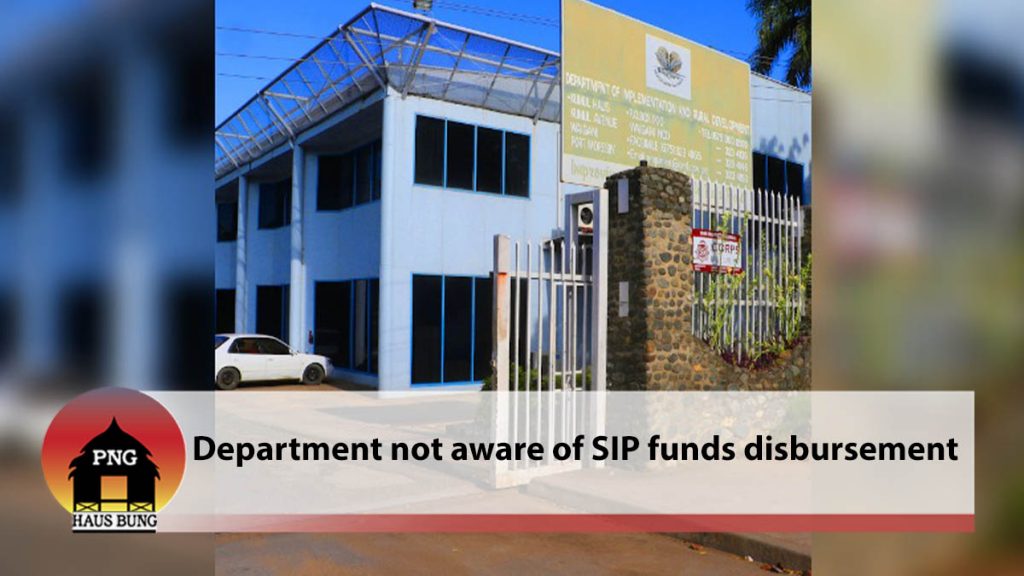The Department of Implementation and Rural Development (DIRD) has clarified today that the disbursement and frontloading of Service Improvement Program (PSIP & DSIP) to sub-national administrations is done by the Department of Finance (DoF).
DIRD which is mandated to coordinate, supervise, monitor and manage programs and grants under the SIP ensuring their effective integration and synergy with activities under public investment program (PIP) is no longer responsible for disbursing SIP funds, however only mandated to enforce governance and accountability through monitoring to ensure realization of impact developments.
Secretary for Aihi Vaki stressed this following a news article published in the Post Courier last Friday on “Yu Tok” program entitled “Acquittal and technical capacity should be a factor for development funds to be released”.
Mr. Vaki highlighted that the government’s policy on service improvement program (SIP or PSIP & DSIP) is seen as a critical rural development initiative making significant impacts since its introduction by the Somare Government in 2007.
“Since the introduction of District Development Program (DDP) with K1.0 million funding in 2000-2001 then increased to SIP with K10.0 million per electorate from 2013 to the present with many districts experiencing unprecedented developments taking shape such as rural water and electrification, roads and bridges, communication towers, District Hospitals/Health Centres, Technical schools, modern classrooms, SMEs, district markets among others which must be appreciated,” he said.
However, he said that although there is a National Executive Council (NEC) Decision of 2018 exists to park all SIP grants at DIRD as “one-stop-shops” for ease of funds accessing, monitoring of implementation and reporting of developments by 111 subnational administrations (provinces and districts) to government but this role still remains with Department of Finance through an administrative decisions.
So Department of Finance now remitting SIP grants using the Integrated Financial Management Systems (IFMS) to subnational through their provincial and district treasury operating accounts.
“However, DIRD only manages the Constitutional Grants or Provincial and District Support Grants which the department strictly administers where all Constitutional Grants are remitted based on the submission of the previous year’s fiscal report,” he said.
Mr. Vaki further elaborate that while the disbursement is done by the Department of Finance, DIRD is not aware of how much SIP funds has been frontloaded to subnational in 2020 and 2021 to date.
“The annual SIP disbursement figures does not reconcile with the acquittal reports from the subnational administrations,” he said.
He said the problem is that DIRD has not been supported with SIP monitoring funds though budget submissions detailing yearly work plans have been submitted to the national budget planners every year. The funding for monitoring also covers interagency team to travel to the electorates as required under the Administrative Guidelines and Financial Instructions.
“The Department continues to provide technical and policy advice on daily basis and maintains close dialogue with the Administrators, Finance Managers and political leaders so they are fully aware of Administrative Guidelines and Financial Instructions to ensure good governance and accountability in the management of SIP funding,” Vaki said.
Aihi said national government is playing its mandated roles and responsibilities to ensure people in rural villages and communities receive minimum services that would transform their lives, however the onus rests entirely on the leadership role played at the sub-national administration in the management of these development grants. The DDAs and provincial administrations in their development planning should critically focus on minimum standards and bridging development gaps.
He said some provinces and districts faced challenges in terms of logistics due to geographical isolation and remoteness, however these should not be an excuse. The administration must strategically plan and ensure the implementation process continues to deliver tangible development to remote corners of their respective electorates.
“As far as the national government is concerned, SIP program is here to stay, all we desire is stable political and administrative leadership required to deliver basic services based on a realistic five year development plans and good people focused decisions, not contrary,” he said.
He also highlighted that violating of the Administrative Guidelines and Financial Instruction by not submitting acquittal reports, development plans and budgets contribute to misapplication of SIP funds.
Vaki added that provinces and districts must counter-fund projects through PSIP and DSIP to collectively achieve greater results towards delivery of services. Provinces exists because of districts therefore PSIP must be applied equally.
Currently, the department is developing a DIMS/SIP data base system with the assistance from Australian Government through DFAT to enhance the department’s competence to measure the performance of all 111 electorates so that at the end of the day there is an effective reporting system to NEC and Parliament also importantly a source of reliable planning data for all levels of government.

